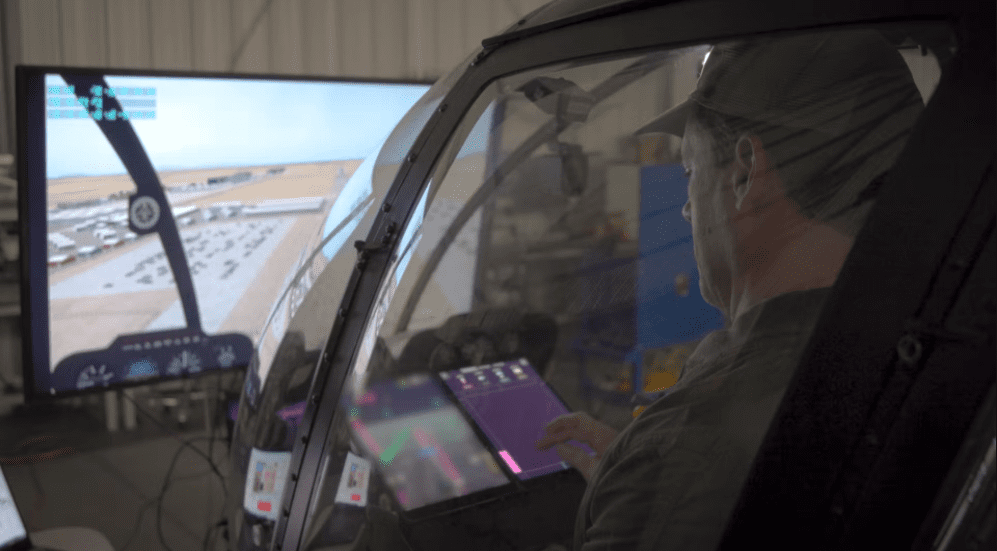
The Skyryse FlightOS flight control interface, shown here in a simulator at the startup’s technology lab, will be retrofitted to 400 fixed and rotary wing air medical transport aircraft under a new agreement between the Los Angeles-based startup and Air Methods, one of the largest air medical services providers in the U.S. (Photo, courtesy of Skyryse)
Air Methods, one of the largest air medical service providers and helicopters operators in the U.S., has signed a new agreement with California-based transportation technology provider Skyryse to retrofit more than 400 single-engine helicopters and fixed-wing aircraft with the FlightOS automation hardware and software.
Skyryse first started making headlines in 2019 after using its flight stack automation technology—a combination of helicopter flight and communications systems including “smart helipads”—to autonomously fly a modified Robinson R44 helicopter with no human intervention. In addition to retrofitting its air medical transport fleet with FlightOS, Air Methods will invest $5 million into a Series B funding round for Skyryse, bringing the startup’s total raised to $205 million.
The Air Methods’ total fleet of owned, leased, or maintained aircraft features more than 450 helicopters—the world’s largest fleet of civilian helicopters—and fixed-wing aircraft operating at more than 300 bases across the U.S., transporting more than 100,000 people last year. A partnership video released by the two companies shows Air Methods pilots evaluating the new technology in the Skyryse FlightOS technology in Big Bear, California, replacing the traditional cyclic-collective flight controls with a side stick and touchscreen tablet interface for the pilots.
Mark Groden, CEO of Skyryse, told Avionics International in emailed statements that the retrofit program will replace the cockpit systems featured on fixed and rotary-wing aircraft in the Air Methods fleet with a “full fly-by-wire system that’s built to commercial airliner standards.” That setup is paired with Skyryse’s “universal flight deck and four-axis side stick,” according to Groden, who also notes that the company provides all of the necessary communications and navigation systems along with sensors necessary to enable their system.
“We will be replacing traditional flight controls, avionics, radios, GPS, and ADS-B with our system,” Groden said. “We replace airframe specific and complicated flight controls with a touch screen interface and a four-axis side stick. That shift dramatically reduces pilot workload in the cockpit and we also handle emergency situations such as autorotation. We are currently doing autorotations with FlightOS, an industry first.”
As Groden previously explained in a March 2020 interview with Avionics, FlightOS is designed to be easy enough to control and learn that people with little to no flying experience could learn to use it. While the flight controls are manipulated through the touchscreen tablet and side-stick setup, on-board computers control all aspects of the flight envelope, manage the airframe’s structure and aerodynamic operating limits, and leverage exterior radar and sensors for real-time situational awareness.
Skyryse has continued to raise capital and develop its FlightOS technology as well as provide media demonstrations over the last year. Michael Huerta, the former FAA Administrator, and Chris Hart, former chairman of the National Transportation Safety Board (NTSB), were also added on as advisors in November.
Groden said the company was unable to share details about the cloud computing and IT infrastructure required to enable FlightOS or images of what the retrofitted Air Methods fleet will look like once the upgrades are completed at this time.
“As the leading Air Medical provider in the United States, we are always looking for ways to make rotor and fixed-wing flight safer,” Air Methods CEO JaeLynn Williams said in a statement. “Skyryse is a cutting-edge technology that will drive a step change in the safety of rotor and fixed-wing flight not only for Air Methods, but for our customers and the entire HEMS industry.”